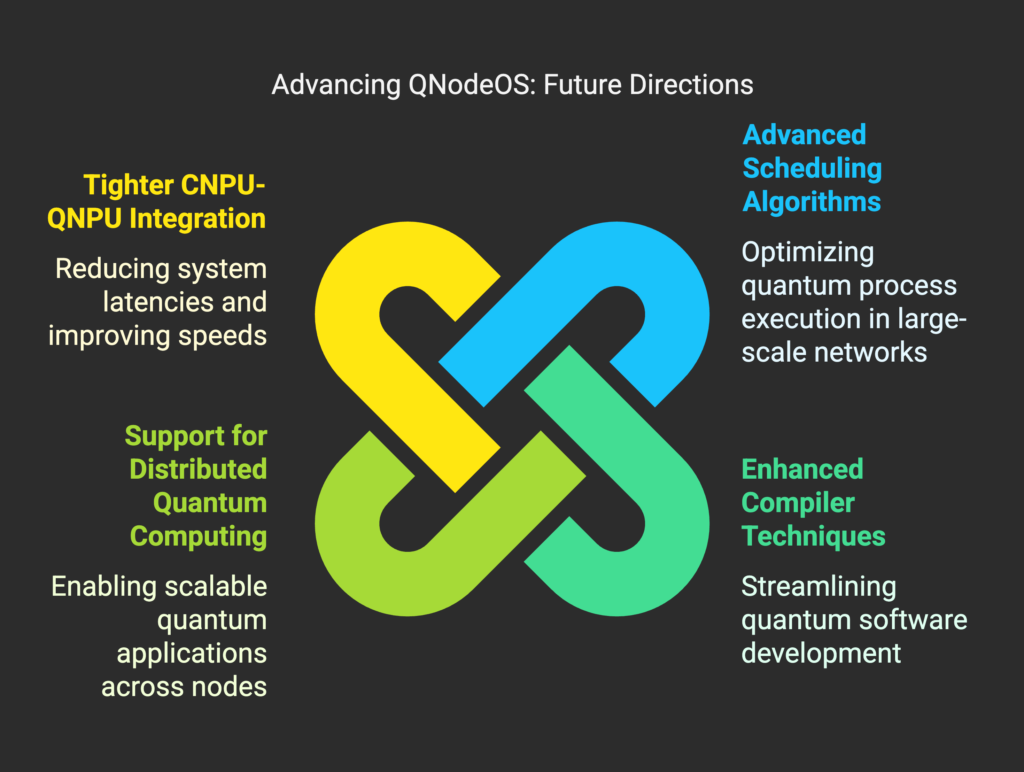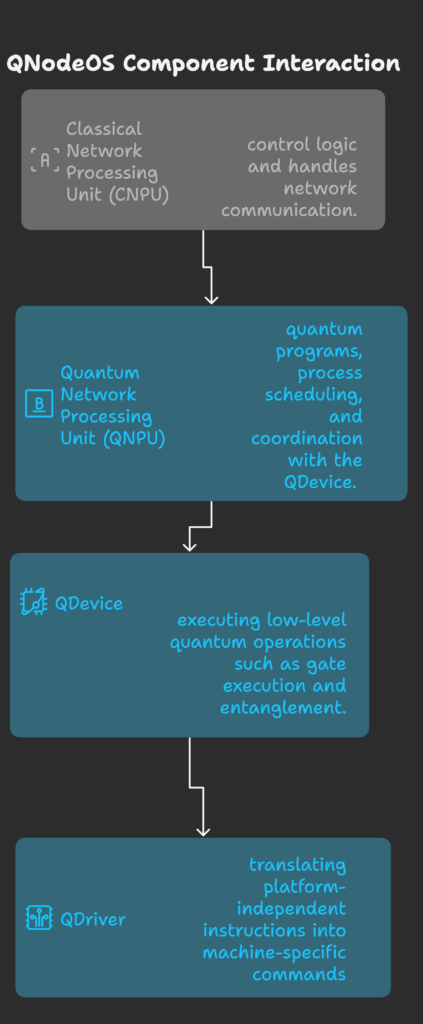
QNodeOS: The Future of Quantum Network Operating Systems
Introduction
Quantum networks are poised to revolutionize communication, computing, and cryptography. However, a major roadblock has been the lack of a standardized operating system for executing quantum applications across different hardware platforms. At Quambase, we explore quantum advancements that bridge the gap between research and real-world implementation. A groundbreaking development in this field is QNodeOS, the first-ever operating system designed to execute quantum network applications on quantum processors using platform-independent high-level software.
What is QNodeOS?
QNodeOS is an operating system tailored for quantum networks, enabling the execution of quantum applications without requiring deep hardware-level knowledge. Unlike previous ad-hoc, experiment-specific software, QNodeOS provides:
🔹 High-Level Programming – Enabling quantum applications to be executed like classical internet applications.
🔹 Hardware Independence – Supporting diverse quantum processors through a unified software-hardware interface.
🔹 Efficient Multitasking – Allowing concurrent execution of multiple quantum applications on a single node.
🔹 Real-Time Scheduling – Managing local quantum operations and network-wide entanglement generation.
Why Does QNodeOS Matter?
🚀 Bridging Classical and Quantum Computing – QNodeOS introduces an interactive framework where classical and quantum components work together, a key requirement for real-world applications.
⚡ Unlocking Quantum Internet Applications – By standardizing quantum network programming, QNodeOS paves the way for applications in secure communication, distributed quantum computing, and advanced cryptographic protocols.
🔧 Multitasking for Quantum Networks – The system enables parallel execution of multiple quantum processes, improving efficiency and utilization of quantum resources.
Key Innovations in QNodeOS
🏗 Modular Architecture
QNodeOS consists of three core components:
🔹 Classical Network Processing Unit (CNPU) – Executes classical control logic and handles network communication.
🔹 Quantum Network Processing Unit (QNPU) – Manages quantum programs, process scheduling, and coordination with the QDevice.
🔹 QDevice – The quantum hardware, executing low-level quantum operations such as gate execution and entanglement.

A Hardware Abstraction Layer (QDriver) ensures seamless compatibility with various quantum hardware, translating platform-independent instructions into machine-specific commands.
🏆 Quantum-Optimized Scheduling & Execution
✅ Interactive Classical-Quantum Execution – Unlike batch-based quantum computing, quantum networks require continuous interaction between classical and quantum operations.
✅ Efficient Entanglement Generation – Network-wide coordination for generating and managing quantum entanglement.
✅ Dynamic Task Scheduling – Concurrent execution of multiple quantum applications using a Quantum Memory Management Unit (QMMU).
QNodeOS in Action: Real-World Demonstrations
Researchers validated QNodeOS with two breakthrough experiments:
🔹 Delegated Quantum Computation (DQC) – A successful quantum computation between two NV-center-based quantum network nodes, demonstrating QNodeOS’s ability to coordinate entanglement generation, classical message passing, and millisecond-scale quantum memory lifetimes.
🔹 Multitasking on Quantum Nodes – The system executed two quantum applications simultaneously (Delegated Quantum Computation and Local Gate Tomography), proving QNodeOS’s ability to efficiently utilize quantum hardware resources.

📊 Results showed that multitasking increased device utilization while maintaining high-fidelity quantum operations.
The Road Ahead: The Future of Quantum Network OS
QNodeOS lays the foundation for a new era of programmable quantum networks. Future research directions include:
🔹 Advanced Scheduling Algorithms – Optimizing the execution of quantum processes in large-scale networks.
🔹 Enhanced Compiler Techniques – Streamlining quantum software development.
🔹 Support for Distributed Quantum Computing – Enabling scalable quantum applications across multiple nodes.
🔹 Tighter CNPU-QNPU Integration – Reducing system latencies and improving execution speeds.
Conclusion: Towards a Quantum-Powered Internet
At Quambase, we believe that quantum networks will define the next phase of computing and secure communication. QNodeOS is a game-changer, setting the stage for a future where quantum applications are as accessible as classical ones.
🔍 Stay Updated on Quantum Computing & Networks
Follow Quambase for the latest insights into quantum operating systems, scalable quantum architectures, and the future of the quantum internet.
#QuantumComputing #QNodeOS #QuantumNetworks #QuantumInternet #FutureOfAI #Quambase
